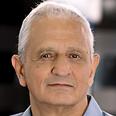This isn’t a meeting; not even half a meeting. The session to take place in New York Tuesday is a joke at the expense of an American president who tried to get involved in Mideast politics and was stung.
Over the weekend, some of the best minds in Washington were preoccupied with the question of who’s responsible for the screw-up; is it the president and his people or special envoy George Mitchell? Yet one thing remained undisputed: The end result.
Barack Obama is a promising president; there’s no doubt about that. The question that hangs above him is whether he is also a president who delivers on what he promised. The trouble in our region can be used as a fable reflecting the other troubles maligning his administration.
At the outset of his term in office, Obama promised that resolving the Mideastern conflict will be one of his major targets during his tenure. Within two years, the Israelis and Palestinians will finalize an agreement, with other Muslim countries joining the peace celebration. A special envoy was appointed – an esteemed and experienced man – the right speeches were delivered, the proper messages were conveyed, and now all that was left was to get the show on the road.
Just like with the sad story about Uzi Dayan’s father, who screamed “follow me” in the army and only later discovered that he is running alone, Obama’s “follow me” was also not endorsed by others.
It started with Obama’s visit to Saudi Arabia. He asked King Abdullah to order modest trust-building gestures that would accompany the resumption of talks between Israel and Abbas. The Saudis refused. They said they will not do anything before Israel withdraws from the entire territories.
Their refusal made it more difficult to convince oil sheikdoms and other Arab states. The gestures lost their significance: Israel’s public opinion nay have been willing to pay a price in exchange for ties with Saudi Arabia, but an interest office in Qatar doesn’t get it excited.
Being cool isn’t enough
It continued with the futile effort to force Netanyahu to commit to an absolute construction freeze in the settlements. The demand for a freeze was logical: It was meant to make it easier for Abbas and his colleagues in the Arab world. The moment Mitchell entered detailed negotiations regarding what will be built and what will not be built, he got stuck in a dead-end.
Netanyahu could not appear to be capitulating; meanwhile, Abbas could not appear to reconcile himself to continued construction. These were the chronicles of a failure foretold.
In the absence of a deal on opening positions and continuation scenarios, the meeting will be no more than a photo opportunity. It does not even mark the beginning of the beginning of a process.
The Americans discovered that they want an Israeli-Palestinian agreement more than the leaders of both sides desire one. This is the tragedy of both peoples: Both Netanyahu and Obama prefer to make do with what’s available now, rather than taking a risk with decisions that will exact a heavy political price. None of them is a Ben-Gurion, or a Begin, or a Rabin.
When an American president encounters such wall, he faces two possibilities: Either distancing himself from the source of trouble (that’s what President Bush did throughout most of his term in office) or attempting to force his view (this is what Carter did and what Clinton tried to do.)
Obama chose neither option A nor option B. He could have let Netanyahu and the Arab rulers, including Abbas, sweat. Everyone depends on America, its money, its military aid, and its moves vis-à-vis Iran. Yet instead of letting them sweat, the one sweating was Mitchell.
Obama also did not attempt to force his views. He read the polls that show the drastic decline in Israelis’ and American Jews’ trust in him. He could have addressed Israel’s public opinion above Netanyahu’s head. Repeated discussions about it were held at the White House, but no decision was taken.
Israelis, who for 16 years were pampered by loving presidents in the White House, did not get from Obama the love they became addicted to. Yes, he conveyed his well-wishes on the occasion of Rosh Hashana. But he also sent similar well-wishes to the Iranians.
He is cool. His coolness, his self control, and his sense of comfort in any environment hold great charm. Yet the US president is not Brad Pitt or George Clooney. He’s supposed to bring results.
















